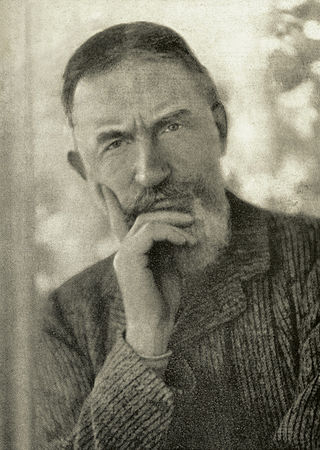
George Bernard Shaw, known at his insistence as Bernard Shaw, was an Irish playwright, critic, polemicist and political activist. His influence on Western theatre, culture and politics extended from the 1880s to his death and beyond. He wrote more than sixty plays, including major works such as Man and Superman (1902), Pygmalion (1913) and Saint Joan (1923). With a range incorporating both contemporary satire and historical allegory, Shaw became the leading dramatist of his generation, and in 1925 was awarded the Nobel Prize in Literature.

Raymond Hart Massey was a Canadian actor, known for his commanding, stage-trained voice. For his lead role in Abe Lincoln in Illinois (1940), Massey was nominated for the Academy Award for Best Actor. He reprised his role as Lincoln on television and in How the West Was Won (1962). Among his other well-known roles were Dr. Gillespie in the NBC television series Dr. Kildare (1961–1966), John Brown in Santa Fe Trail (1940) and Seven Angry Men (1955), Abraham Farlan in A Matter of Life and Death (1946), and Jonathan Brewster in Arsenic and Old Lace (1944).

Hedda Gabler is a play written by Norwegian playwright Henrik Ibsen. The world premiere was staged on 31 January 1891 at the Residenztheater in Munich. Ibsen himself was in attendance, although he remained back-stage. The play has been canonized as a masterpiece within the genres of literary realism, nineteenth century theatre, and world drama. Ibsen mainly wrote realistic plays until his forays into modern drama. Hedda Gabler dramatizes the experiences of the title character, Hedda, the daughter of a general, who is trapped in a marriage and a house that she does not want. Overall, the title character for Hedda Gabler is considered one of the great dramatic roles in theater. The year following its publication, the play received negative feedback and reviews. Hedda Gabler has been described as a female variation of Hamlet.

Dame Agnes Sybil Thorndike, Lady Casson, was an English actress whose stage career lasted from 1904 to 1969.

Harley Granville-Barker was an English actor, director, playwright, manager, critic, and theorist. After early success as an actor in the plays of George Bernard Shaw, he increasingly turned to directing and was a major figure in British theatre in the Edwardian and inter-war periods. As a writer his plays, which tackled difficult and controversial subject matter, met with a mixed reception during his lifetime but have continued to receive attention.

Katharine Cornell was an American stage actress, writer, theater owner and producer. She was born in Berlin to American parents and raised in Buffalo, New York.
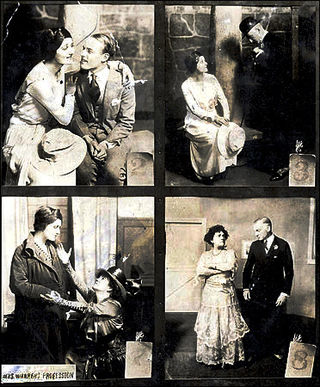
Mrs. Warren's Profession is a play written by George Bernard Shaw in 1893, and first performed in London in 1902. It is one of the three plays Shaw published as Plays Unpleasant in 1898, alongside The Philanderer and Widowers' Houses. The play is about a former prostitute, now a madam, who attempts to come to terms with her disapproving daughter. It is a problem play, offering social commentary to illustrate the idea that the act of prostitution was not caused by moral failure but by economic necessity. Elements of the play were borrowed from Shaw's 1882 novel Cashel Byron's Profession, about a man who becomes a boxer due to limited employment opportunities.

Janet Achurch was an English stage actress and actor-manager. She made her London debut in 1883. She played many Shakespearean roles, but is best known as a pioneer of major roles in the works of Ibsen and George Bernard Shaw. Her most notable role was as Nora in the first English production of A Doll's House (1889). She was married to actor Charles Charrington.
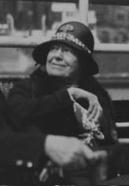
Charlotte Frances Payne-Townshend was an Irish political activist in Britain. She was a member of the Fabian Society and was dedicated to the struggle for women's rights. She married the playwright George Bernard Shaw.
Andrew Havill is an English actor. With an extensive career on screen and stage beginning in the late 1980s, Havill has appeared in more than 40 films and 50 plays. After training in Oxford and London, he began his career in repertory theatre in 1989 and made his screen debut in 1993. As a character actor, Havill has appeared extensively in British costume dramas.

The Irish Repertory Theatre is an Off Broadway theatre founded in 1988.
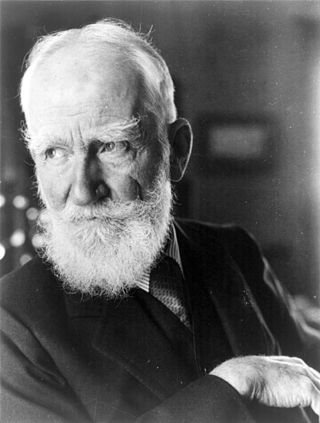
How He Lied to Her Husband is a one-act comedy play by George Bernard Shaw, who wrote it, at the request of actor Arnold Daly, over a period of four days while he was vacationing in Scotland in 1904. In its preface he described it as "a sample of what can be done with even the most hackneyed stage framework by filling it in with an observed touch of actual humanity instead of with doctrinaire romanticism." The play has often been interpreted as a kind of satirical commentary on Shaw's own highly successful earlier play Candida.
Robert Sholto Johnstone Douglas, known as Sholto Douglas, or more formally as Sholto Johnstone Douglas, was a Scottish figurative artist, a painter chiefly of portraits and landscapes.
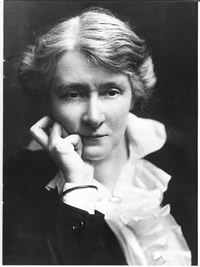
Edith Ailsa Geraldine Craig, known as Edy Craig, was a prolific theatre director, producer, costume designer and early pioneer of the women's suffrage movement in England. She was the daughter of actress Ellen Terry and the progressive English architect-designer Edward William Godwin, and the sister of theatre practitioner Edward Gordon Craig.
Michael Halberstam is an American stage actor and director. He co-founded the Writers Theatre in Glencoe, Illinois, and served as its artistic director until 2021. He resigned after years of reported harassment and abuse from artists working at the theater.

Passion, Poison, and Petrifaction is a short play by Bernard Shaw, subtitled The Fatal Gazogene: a Brief Tragedy for Barns and Booths. It is a comic mock-melodrama, written to raise funds for charity. It has been revived occasionally, in tandem with other short works by Shaw or by other playwrights.
"Candida" is a 1962 Australian television play.
Writers Theatre is a non-profit theatre company founded in 1992 and located in Glencoe, Illinois. Michael W. Halberstam, the founder of the company, was an artistic director from its inception in 2021. Kathryn M. Lipuma has been an executive director since 2007.
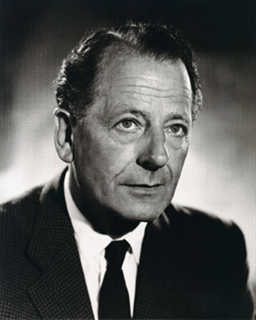
Robert Harris was a British actor. He graduated from Royal Academy of Dramatic Art in 1925, and his stage work included seasons at Stratford, the Old Vic, and on Broadway as Marchbanks in Bernard Shaw's Candida in 1937, opposite Katharine Cornell; He also appeared in more than sixty films from 1930 to 1982.

Betty Chancellor was an Irish actress.
















